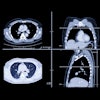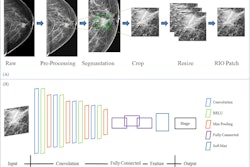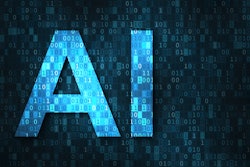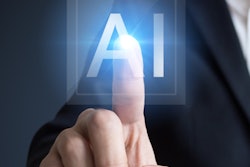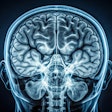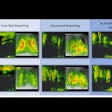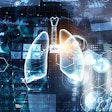An AI algorithm boosts junior radiologists' breast cancer detection metrics, according to a presentation delivered March 1 at ECR 2024.
The study findings could make a busy radiology department more effective, said presenter Mehran Arab Ahmadi, MD, of Tehran University of Medical Sciences in Iran.
"[We found that] AI can improve the diagnostic capabilities and detection rates of radiologists with less than five years experience," he told session attendees.
Breast cancer is the leading cause of cancer death among women around the world, Arab Ahmadi noted. Screening for the disease with mammography can be tricky, however: High resolution is needed to identify small lesions, there can be indistinct boundaries on some lesions that mimic normal tissue, and high variation exists among fibroglandular patterns. All of these characteristics can make finding breast cancer with mammography challenging for less experienced readers.
That's how AI can help, Arab Ahmadi said. He and colleagues explored whether an AI algorithm could improve junior radiologists' cancer detection performance via a study that included 2,060 digital mammography exams from 515 women taken between 2018 and 2022. Of these exams, 240 showed malignancies and 1,820 were benign. Four junior radiologists reviewed and interpreted the exams without assistance from the AI algorithm and then were presented with AI-generated interpretations of the same exams and given the opportunity to revise their interpretations. Arab Ahmadi's group compared radiologist performance before and after AI assistance, tracking measures such as the area under the receiver operating curve (AUC), sensitivity, and specificity.
The AI technology improved the AUC and sensitivity of the junior radiologists' reading performance, helping them identify previously missed masses, calcifications, distortions, and asymmetries.
| Performance of junior readers of mammography screening exams, with and without AI assistance | ||
|---|---|---|
| Measure | Without AI assistance | With AI assistance |
| AUC | 0.81 | 0.84 |
| Accuracy | 79.8% | 83.4% |
| Sensitivity | 75% | 92.9% |
| Specificity | 84% | 74% |
"[AI-boosted readers' sensitivity] while keeping specificity acceptable, which is the most important in the screening phase," Arab Ahmadi concluded.
In a related talk presented during the same session, Andrea Nitrosi, MD, of Azienda Unità Sanitaria Locale Reggio Emilia in Italy shared results from a study that demonstrated how using AI with screening mammography can reduce radiologists' workload. Nitrosi's group analyzed 31,747 breast cancer screening exams and used an AI algorithm (iCAD's ProFound AI 2D system) to determine recall rates. The study found a modest reduction in the final recall rate with the use of AI -- 3.7% compared with 3.8% without AI assistance. But it also found a workload reduction of up to 34.3%, the investigators reported.
"Adding [AI] support to a standard screening scenario could result in a substantially lower screen reading workload," Nitrosi concluded.
For more coverage from ECR 2024, please visit our RADCast.



